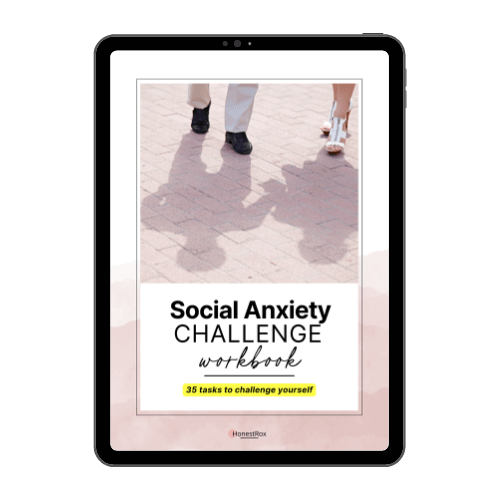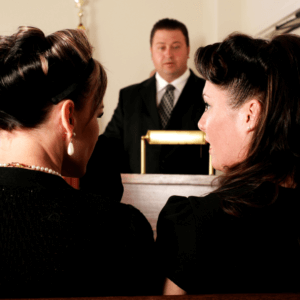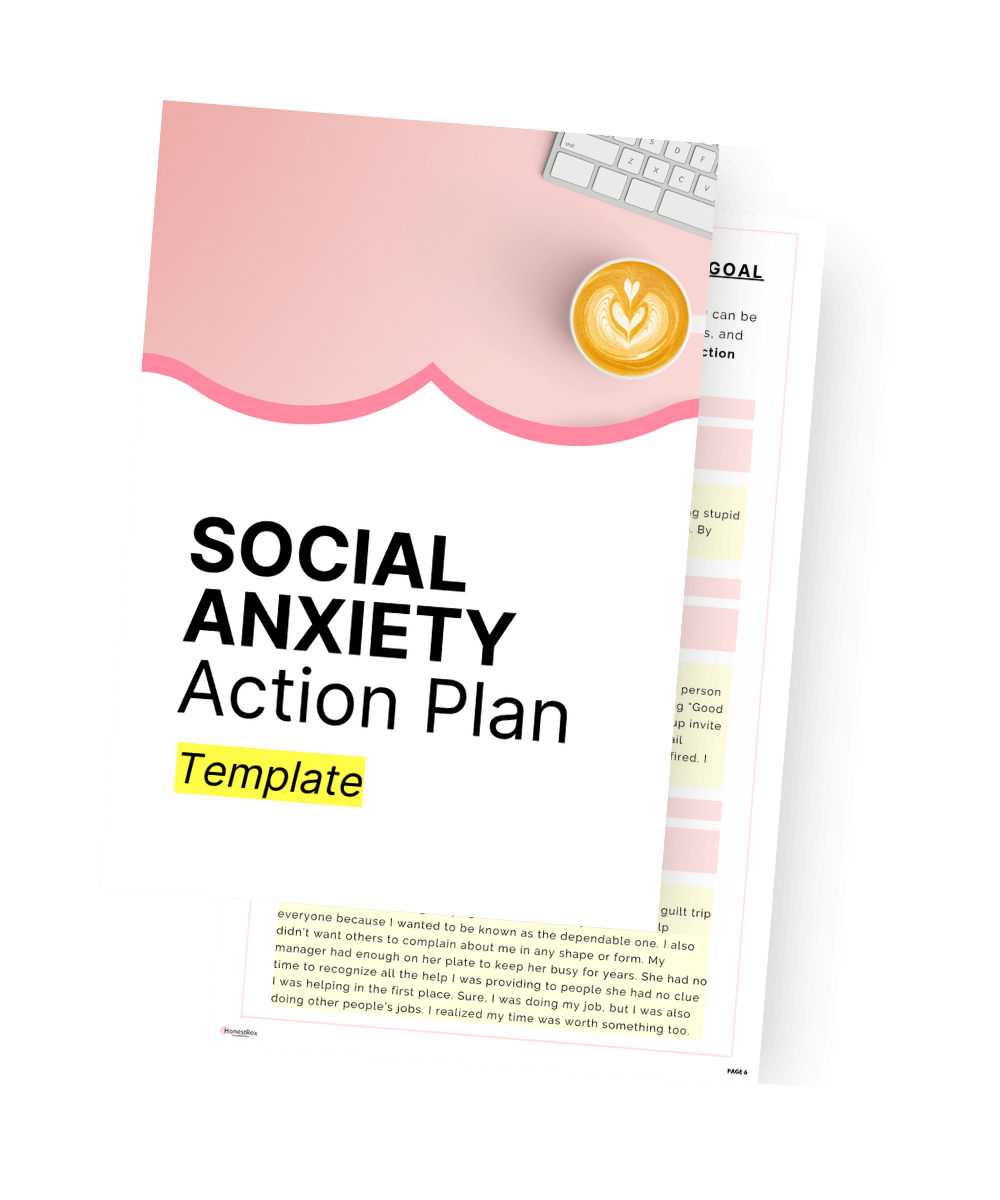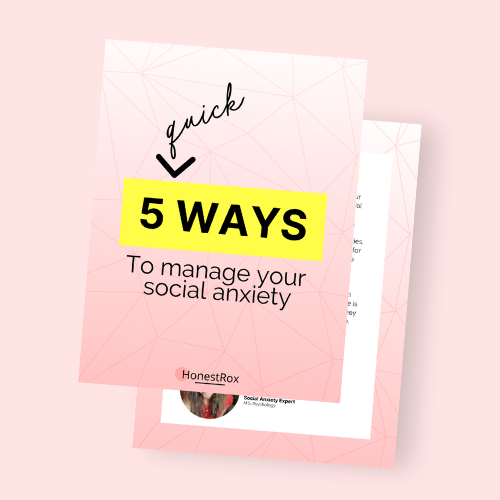
Social Anxiety
Why Your Social Anxiety Is So Bad
There’s more to your social anxiety than just the “regular” causes and reasons – read to find out what “it” is
Knowing the root cause isn’t enough to explain why your social anxiety is so bad.
Before we go into this week’s episode, I want to briefly refresh what we discussed in the last one: the root cause of social anxiety. I use this information to build my case in this episode, so we must remember it.
Ok, so, as discussed, the root cause of social anxiety is a mix of the following:
- Predisposition (biological factors that include genetic predispositions, brain chemistry, brain structure, and family history of anxiety)
- Environment (external circumstances such as childhood trauma and negative experiences such as bullying and social rejections)
- Temperamental (individual personality traits and temperament, for example, being more introverted)
- Psychological (cognitive distortions or thought errors, negative self-image)
In today’s episode, we will talk about why your social anxiety is so bad and what you can do about it.
Because sure, you’re now aware of how it came to be, but you are not exactly sure why it’s so front and center in your life. Isn’t getting to the root cause of something the usual fix with everything in life?
Toy isn’t working, find out the battery died, replace the battery, and ta-da, problem solved!
Unfortunately, when it comes to humans, it’s a bit more complicated than that. We’re going to break it all down by using a plant analogy.
So to fully understand the analogy, let’s bring back the 4 main factors that make up the root cause of social anxiety and connect them to the process of growing a plant:
- We have the seed which represents the predisposition to social anxiety.
- The soil represents the environment that influences the development of social anxiety.
- The water represents psychological factors (negative thoughts and cognitive distortions) nurturing social anxiety.
- And the roots which represent life experiences that contribute to the growth and entrenchment of social anxiety
You can always come back here to re-align yourself if you get lost!
Now, imagine there’s a mad scientist called Joe.
Joe designed a personalized seed that has the potential to grow into an evil plant that releases poisonous air each time they experience social anxiety.
And with each inhale of this poisonous air, the person’s social anxiety worsens. Wonderfully evil, right?
And since Joe is that evil and figured out how to do that, he chose you as his first testing subject because he wants to see how much poisonous air your plant can make.
Not sure what his goal is, but it probably has something to do with world domination and controlling people.
Anyway, he whipped this up and planted the seed in your backyard. As far as you know, he was just a nice gardener who came to clean up your yard.
Little do you know, there’s an evil plant about to sprout.
These combined elements (the seed, soil, water, and sun) can bring the plant to life at any moment. The seed itself (because of Joe’s evil genius) holds tiny blueprints tied to your biological factors; a personalized mixture of genetics, temperament, and family history.
But just because the seed is planted doesn’t mean it will grow.
A seed needs the proper nutrients and conditions to germinate, and this is where the soil plays a huge part. The soil comprises childhood experiences, family dynamics, and social and living situations.
Joe hoped you’d have the right soil in his yard, else his experiment would have failed!
So, the seed is there, and the right soil is in place. You regularly water your soil since you care for the garden (representing your life).
As it’s watered, the seed absorbs the water to swell in size. The water, in this case, is thought errors. The seed will not reach its full potential if it’s not watered enough. In this case, that would be a positive thing.
But let’s say you did water it enough with your negative thoughts. If the soil (your life experiences), is filled with supportive and positive influences, the plant won’t grow.
However, the plant starts to grow if the soil is “toxic” due to negative experiences.
But given that we’re here talking about social anxiety, I will assume that the seed is in the right type of soil to grow into an evil plant. So the seed is planted, watered, and growing.
The seed enters a latent or hidden stage in the process. It’s breaking down and digesting the compounds inside of it. This is why many of us would say that we don’t remember having social anxiety as a child and that it developed later.
While it’s doing its thing, you’re experiencing life and getting hit by it.
Punched in the stomach one day and gossiped about the next. With each experience you have, the roots grow stronger, strengthening the seed. This is when your experiences impact your social anxiety, increasing the frequency of your negative thoughts.
And since the plant is evil, the more it’s watered, the faster it grows.
With time, if there’s no help to remove the seed or awareness that there is one in the first place, it will grow wildly into a fully-blown plant that is out of control.
This growth is often unnoticed until the plant has invaded your life to such an extent that it’s hard to ignore. Many of us didn’t know we had social anxiety until way later.
We felt like we didn’t know “how to do life” like everyone else.
So, all these things came together, and now you have this plant that’s made its way into your house you can’t get rid of because the roots run through your floor and are intertwined with your furniture.
By this point, it’s not a cute plant anymore, but like an overgrown weed wreaking havoc in your home.
Not only is it in the way, but years of its poisonous air have seeped into your home, and you’re drenched in it along with all your belongings. It feels like you’ll never be clean of it.
Ok, here’s what we know so far:
- There’s an evil plant in your home:: The cycle starts with the existence of the “evil plant,” which represents social anxiety.
- The evil plant releases poisonous air: Each time you experience social anxiety, the evil plant releases poisonous air, making you feel bad (we need to find out what this poison is made of).
- Negative thought patterns water the plant: Your negative thoughts effectively ” water” the evil plant and enable its growth. These thoughts can also be fueled by the poisonous are making you feel bad.
- Roots grow stronger from life experiences: As you continue to experience life events, particularly negative or challenging ones, these experiences act like fertilizer for the plant, causing the roots to grow stronger and further entrenching the social anxiety.
- The evil plant grows bigger in the home: The bigger and stronger the plant gets, the more space it takes up in the home, symbolizing an increase in the severity of social anxiety.
Then the cycle begins again with the larger evil plant in the home. Each round of this cycle might make the plant bigger and your situation worse if you don’t act on it.
Joe is thrilled. The evil plant was a success. He didn’t even have to do much because you’re the one who took care of it all along.
But you’re no dummy – you’ve noticed this plant slowly taking over your home, giving you an icky feeling inside each time you get closer to it.
You have a hard time breathing around it. You may not know exactly how it got there, but you know something needs to be done.
First, you need to know what you’re going up against. The plant is harmless – sure, it takes up space, but it’s the poisonous air that’s making you sick and causing the plant to grow stronger.
The poisonous air represents the immediate triggers and reactions that keep your social anxiety alive and kicking.
These reactions feed the plant, exacerbating your social anxiety, which means we’re finally getting to the answer we’ve been looking for all this time.
The poisonous air is toxic shame!
See, each time you experience social anxiety, the evil plant sends a puff of toxic shame into the air.
With time, the toxic shame built up.
To the point where you can’t tap into your authentic self anymore. And then you end up with a crazy evil plant that’s taken over your life.
Toxic shame can lead to emotions that can make you question your worth.
According to psychiatrist Peter Breggin in his book “Guilt, Shame, and Anxiety“ toxic shame can be characterized as:
- feeling worthless
- worrying what others think about you
- being afraid to look stupid
- perfectionism in response to fearing failure
- constant negative self-talk
- anger in response to shame triggers
Pff, if that doesn’t sound like social anxiety…
If predisposition, environment, and psychological factors were instrumental to bringing social anxiety to life, toxic shame keeps it alive.
At this point, it might feel like a lost cause. It’s everywhere! But there’s a way to get yourself back on track.
You do not need to be stuck with this evil plant in your home and soaked in toxic shame.
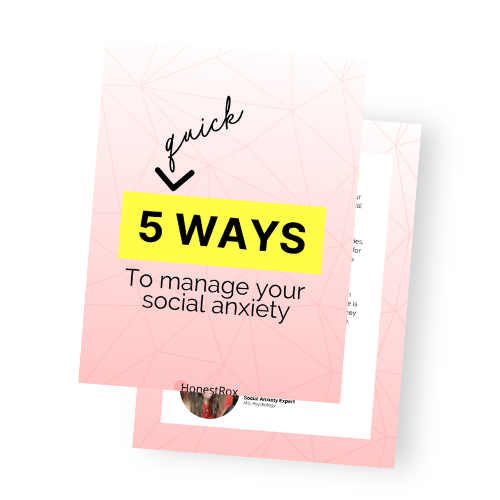
5 Quick Ways To Manage Your Social Anxiety
There’s no substitute for effort, but you can speed up the process if you understand and take these 5 ways seriously. This is your starter pack; what you do with it is up to you.
If your social anxiety is so bad, here’s how to reduce it (using the plant as an analogy):
1. Acknowledge the presence of the plant
This is the first and most important step. You have to acknowledge that the plant exists.
It may be hard to accept that something so harmful has been growing inside your home, but denying its existence won’t make it disappear.
The alternative is to forever walk around it, even though it’s taking up so much space.
Recognizing and accepting that there’s a problem is the foundation for any meaningful change.
2. Understand its nature
Now that you’ve accepted its presence, you must understand what it is and how it functions.
This involves understanding the elements that contribute to its growth – the seed (predisposition), the soil (environment), the water (negative thoughts), and the roots (life experiences).
You also need to acknowledge the role of toxic shame in keeping it alive.
Gaining a deeper understanding of the factors contributing to social anxiety is crucial for figuring out how to manage it.
3. Stop watering it
Remember that watering plants means engaging in negative thought patterns.
You stop watering it by having different thoughts.
Work on reframing your mindset. Cognitive behaviour therapy can help you change thoughts and stop watering the plant.
Changing your thought patterns to stop nurturing social anxiety is an important part of the journey.
4. Remove it from its soil
Change your environment.
This could mean distancing yourself from negative people, changing your lifestyle, or improving your self-esteem and self-worth.
Changing the environment and lifestyle can remove the conditions that allow social anxiety to thrive.
5. Examine the roots
See which are healthy and which are damaged.
Explore the past experiences that have contributed to the growth of this plant.
This could involve trauma therapy, EMDR, or other therapeutic approaches that help to process and heal from past traumas.
Exploring past experiences is super important to understand the origins of your social anxiety and the underlying issues.
6. Prevent future growth
Fertilize the soil with goodness.
Take measures to prevent the growth of a new evil plant. Therapy, self-care practices, building a strong support system, and learning coping strategies for managing social anxiety.
Ensuring the conditions for growing social anxiety aren’t there anymore is essential to managing this long-term.
Now you know that toxic shame keeps your social anxiety alive and kicking. In a future episode, I will address this topic more in-depth.
Why is your social anxiety so bad? It’s important to understand how it came to be (there are 4 contributing factors to the root cause, so take a few minutes to think about them). Once you have a grasp of that, you’ll have a better understanding of how toxic shame comes into play.
Using a plant analogy, the seed is your predisposition to social anxiety, the soil is the environment you grew up in, and the water is your thoughts about yourself. As you water this plant, social anxiety grows. As it grows, so does toxic shame (seeps into your system).
Ultimately, toxic shame makes your social anxiety so bad, and you need to address it.

I'm Roxana

I went from being scared to ask a question out loud to hosting summits online. I love coffee, french crepes, and working from home. My mission? Help others build their social confidence to make friends, have conversations, and be comfortable around people!
Did you find value in my content? Support me by clicking the button!
Recent blog posts
Last Podcast Episode

About the blogger
I'm Roxana Alexandru
As a social anxiety expert I share my best strategies and tips that I’ve learned on my journey to help you manage your social anxiety.
Like what you see here?
Check out the blog!
Must Reads
Grab these freebies
Free Challenge
5 tasks. 3 difficulty levels. Test your social anxiety through exposure therapy.
Grab these freebies
Free Template
Get the template that I personally used and create your own steps for your journey.
A podcast meant to help you be comfortably you, no matter the situation. My goal is to give you the confidence to go out into the world, share your worth, build meaningful relationships, and see yourself as highly capable. It all starts with being your awkward self comfortably.
Awkward together
The “Be socially confident” newsletter drops weekly to inspire, entertain, motivate, and educate you about social anxiety (who knew it could be so much fun?!). Honestly, if anything, you’ll get a kick out of my own experiences and the funny GIFs.

Call me Rox!
I’m obsessed with social anxiety. In a healthy way! After a decade of being debilitated by it, I finally have the tools I need to manage it (the journey itself is no joke). I now use my experience to help others.

